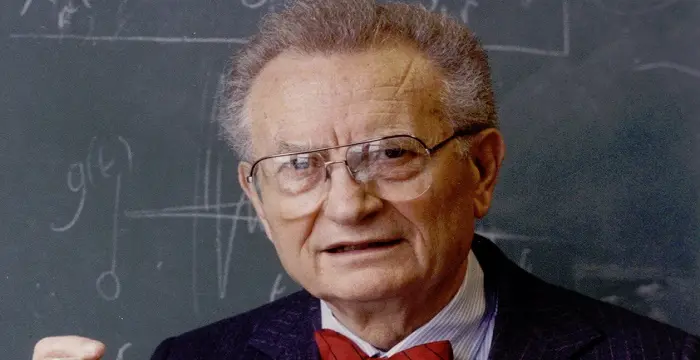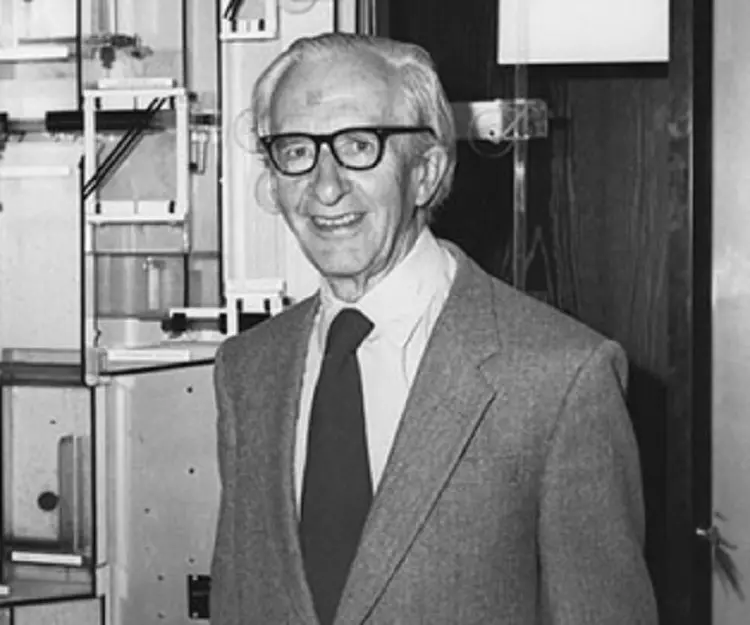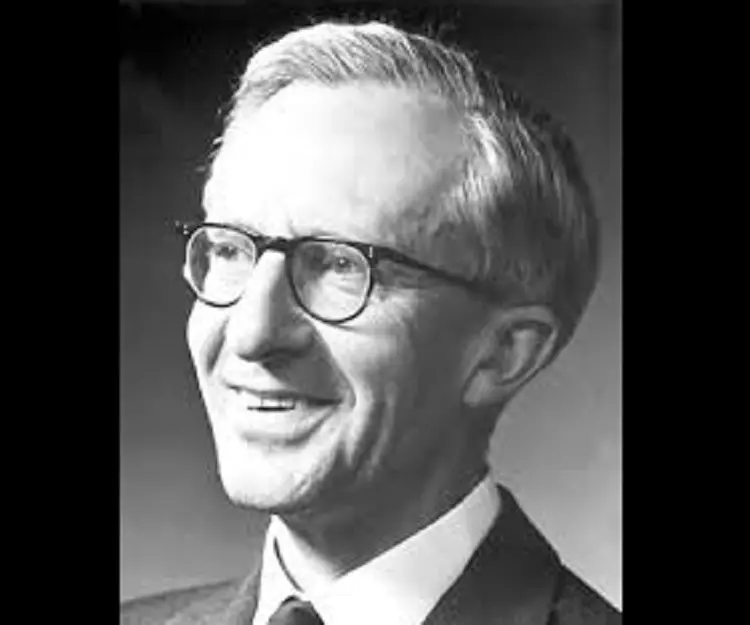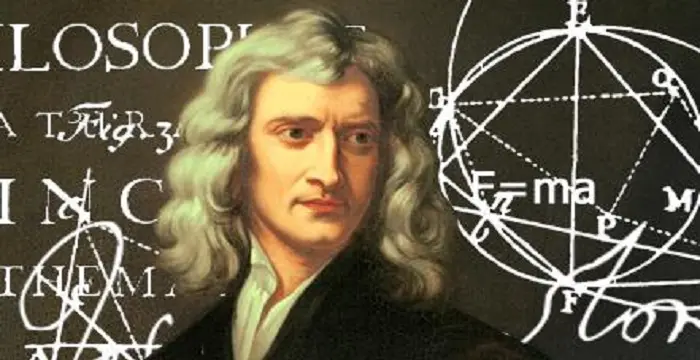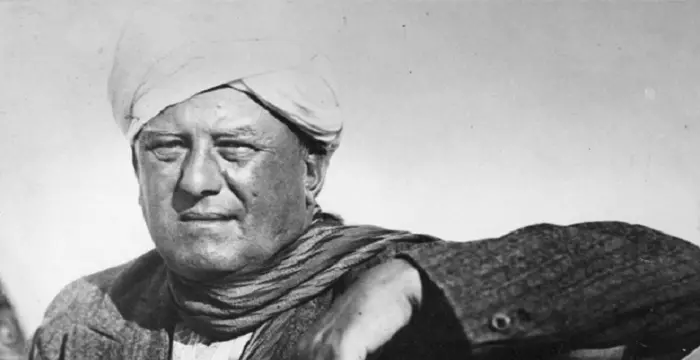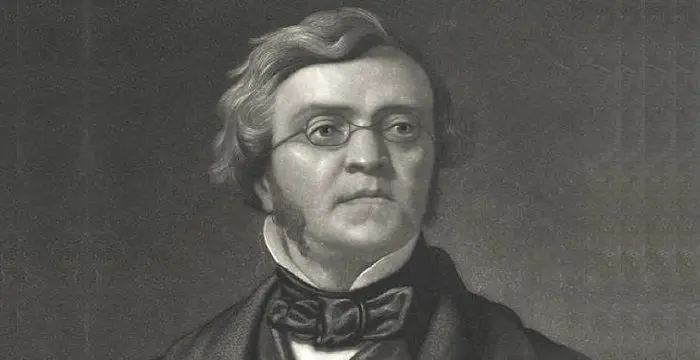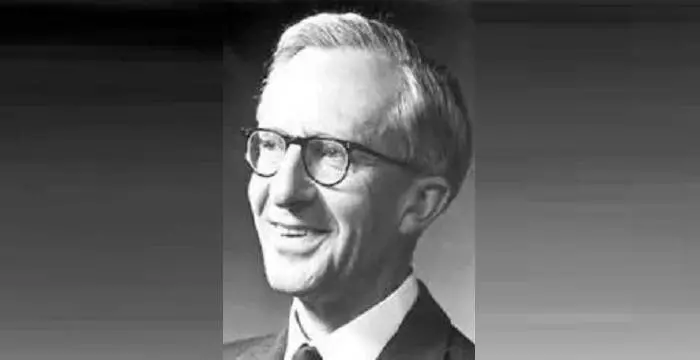
James Meade - Economists, Birthday and Family
James Meade's Personal Details
James Edward Meade was a British economist who was one of the co-recipients of the 1977 Nobel Memorial Prize in Economic Sciences
| Information | Detail |
|---|---|
| Birthday | June 23, 1907 |
| Died on | December 22, 1995 |
| Nationality | British |
| Famous | Trinity College, Cambridge, Intellectuals & Academics, Economists |
| Universities |
|
| Notable Alumnis |
|
| Birth Place | Swanage, United Kingdom |
| Gender | Male |
| Sun Sign | Cancer |
| Born in | Swanage, United Kingdom |
| Famous as | Economist |
| Died at Age | 88 |
// Famous Economists
Bertil Gotthard Ohlin
Bertil Gotthard Ohlin was a famous Swedish economist. This biography profiles his childhood, family life & achievements.
Emily Greene Balch
Emily Greene Balch was an American economist, sociologist and pacifist who won the 1946 Nobel Peace Prize. This biography of Emily Greene Balch provides detailed information about her childhood, life, achievements, works & timeline.
Paul Samuelson
Nobel laureate Paul Anthony Samuelson is referred to as the ‘Father of Modern Economics’. This biography profiles his childhood, life, career, achievements and interesting facts about him.
James Meade's photo
Who is James Meade?
James Edward Meade was a British economist, who, along with Swedish Economist Bertil Ohlin, won the 1977 Nobel Memorial Prize in Economic Sciences. He was well known for his contributions towards formulating theory in international trade and international capital movements. His interest in economics grew while studying in college, and he subsequently obtained a degree from the School of Philosophy, Politics and Economics at Oriel College, Oxford. As part of his academic career, he worked at prestigious institutions like Hertford College in Oxford, London School of Economics and University of Cambridge. During World War II, he served as a war economist and was among the leading economists who served the British government during the time. James Meade was an active advocate of utilizing fiscal policy to attain full employment and using monetary policy to fulfill the government’s goal on ‘balance of payments. As a result of his research, he developed a neo-classical model of economic growth known as ‘Meade's model of economic growth’. A majority of his work is documented in his books ‘Theory of International Economic Policy’ – Volume I and II.
// Famous Intellectuals & Academics
Bertil Gotthard Ohlin
Bertil Gotthard Ohlin was a famous Swedish economist. This biography profiles his childhood, family life & achievements.
Emily Greene Balch
Emily Greene Balch was an American economist, sociologist and pacifist who won the 1946 Nobel Peace Prize. This biography of Emily Greene Balch provides detailed information about her childhood, life, achievements, works & timeline.
Martin Buber
One of the greatest philosophers to have ever walked on earth, Martin Buber contributions to philosophy is a long-standing one. Explore all about his profile, childhood, life and timeline here.
Childhood & Early Life:
James Meade was born on 23 June 1907, at Swanage, a coastal town in England.
He attended Lambrook School between 1917 and 1921 after which he got enrolled in Malvern College and studied there till 1926. Until 1926, his education was focused on learning Greek and Latin languages.
In 1926 he joined Oriel College, Oxford where he continued classical education for two years and then shifted to the then newly founded School of Philosophy, Politics and Economics.
He was offered a fellowship that allowed him to continue his post graduate studies in Economics at the Hertford College at Oxford. During the same time he received an invitation from economist Dennis Robertson to join Trinity College, Cambridge for the year 1930-1931. He subsequently joined Trinity College, Cambridge.
It was while studying at the Trinity College that he got acquainted with economists Piero Sraffa, Austin Robinson, Richard Kahn and Joan Robinson. They together formed the group named ‘Cambridge Circus’. The group met and discussed John Maynard Keynes' publication titled ‘A Treatise on Money’ and provided feedback on Keynes's continuing theoretical work.
Career
In 1931, James Meade was appointed as lecturer at Hertford College in Oxford. He taught there until 1937. He along with other economists in the University, such as, Henry Phelps Brown, Roy Harrod, Lindley Fraser and Robert Hall began teaching economics as a regular subject. This was a novel concept in the university.
James Meade was assigned to teach the complete subject of economic theory. Two subjects that were of particular interest to him were International economics and economics of mass-unemployment.
During that time Oxford University had strong influence on the League of Nations Union and, in 1937, James Meade joined the Economic Section of the League of Nations in Geneva. He served as the editor of the ‘World Economic Survey’ and published the seventh and eighth editions.
In 1940, after the onset of the Second World War, he along with family was forced to leave Geneva and shift to England. In England, he became the member of the Economic Section of the War Cabinet Secretariat. He became the Director in 1946 and remained a member until 1947.
He worked under the guidance of Lionel Robbins along with John Maynard Keynes towards solving everyday economic issues like rationing of food items and deciding pricing policies for nationalized industries.
During his tenure at the Economic Section of the War Cabinet Secretariat, James Meade was able to document the very first estimate of national income and expenditure in UK. He was also part of discussions that led to the White Paper on Employment Policy of 1944 where the UK Government acknowledged the maintenance of employment as responsibility of governmental policy.
He was appointed as professor of commerce at the London School of Economics in 1947. Here, he was assigned to teach international economics and simultaneously he began writing his own book.
During his decade long tenure at the London School of Economics he published two books titled ‘The Balance of Payments’ that focused on global relations between several national economies developed on the Keynesian model and ‘Trade and Welfare’, which exercised the theory of economic welfare to international business including situations where ‘Free Trade’ is beneficial and detrimental to an economy.
In 1957, he shifted from London to the chair of Political Economy in Cambridge, a position he held until 1967.
In 1967, he went on to become a Senior Research Fellow of Christ's College in Cambridge. However, he gave up the fellowship in 1974.
During this time, he began working on his project to write on the domestic aspects of economic theory and policy. In connection with this topic he wrote four volumes titled ‘The Stationary Economy’, ‘The Growing Economy’, ‘The Controlled Economy’, and ‘The Just Economy’.
In 1974, he was elected as Chairman of a committee founded by the Institute for Fiscal Studies, with the objective of analyzing the structure of direct taxation in the United Kingdom. Members of the committee included economists, major practitioners in tax law, administration and accountancy.
Through his studies, he developed a neo-classical model of economic growth that was designed in a way in which the most basic form of economic system would behave during the course of economic growth.
The neo- classical model was developed based on ten assumptions such as the economy being a closed economy, no government activity being involved, optimal competition existed in markets, all machinery was similar, only two commodities were considered- consumption good and capital good etc.
Also, the net output was dependant on four factors i.e., net stock of capital available, amount of available labour force, availability of land and natural resources and state of technical knowledge.
Other literary works published by him include ‘National Income and Expenditure’ with Richard Stone (1944), ‘The Theory of International Economic Policy’ (1951-1955), ‘Efficiency, Equality, and the Ownership of Property’ (1964), ‘Wage Fixing’ (1982), ‘Demand Management’ with David Vines (1983).
Major Works
James Meade was an economist whose work on global economic policy earned him much appreciation. He is particularly known for his work on the theory of international trade and international capital movements. He was the author of several noteworthy books in economics like ‘National Income and Expenditure’, ‘Efficiency, Equality, and the Ownership of Property’ and ‘Demand Management’. His book, ‘Theory of International Economic Policy’, is regarded as bible by every trade economist.
Awards & Achievements
In 1977, James Meade and Bertil Ohlin were jointly awarded the Nobel Memorial Prize in Economic Sciences for their "pathbreaking contribution to the theory of international trade and international capital movements."
Personal Life & Legacy
In 1933, James Meade married Margaret Wilson. The couple had four children; one son and three daughters.
He died on 22 December 1995, at Cambridge, at the age of 88.
// Famous Trinity College, Cambridge
Isaac Newton
Isaac Newton was an English scientist and mathematician, who discovered gravitation and Newtonian Mechanics. Read this biography to find more on his life.
Aleister Crowley
Aleister Crowley was an occultist and ceremonial magician who founded the ethical philosophy of Thelema. This biography of Aleister Crowley provides detailed information about his childhood, life, achievements, works & timeline.
William Makepeace Thackeray
William Thackeray was an English novelist and satirist. Read this brief biography to find more on his life & timeline.
James Meade's awards
| Year | Name | Award |
|---|---|---|
Other | ||
| 0 | Nobel Memorial Prize in Economic Sciences | |
James Meade biography timelines
- // 23rd Jun 1907James Meade was born on 23 June 1907, at Swanage, a coastal town in England.
- // 1926In 1926 he joined Oriel College, Oxford where he continued classical education for two years and then shifted to the then newly founded School of Philosophy, Politics and Economics.
- // 1930 To 1931He was offered a fellowship that allowed him to continue his post graduate studies in Economics at the Hertford College at Oxford. During the same time he received an invitation from economist Dennis Robertson to join Trinity College, Cambridge for the year 1930-1931. He subsequently joined Trinity College, Cambridge.
- // 1931 To 1937In 1931, James Meade was appointed as lecturer at Hertford College in Oxford. He taught there until 1937. He along with other economists in the University, such as, Henry Phelps Brown, Roy Harrod, Lindley Fraser and Robert Hall began teaching economics as a regular subject. This was a novel concept in the university.
- // 1933In 1933, James Meade married Margaret Wilson. The couple had four children; one son and three daughters.
- // 1937During that time Oxford University had strong influence on the League of Nations Union and, in 1937, James Meade joined the Economic Section of the League of Nations in Geneva. He served as the editor of the ‘World Economic Survey’ and published the seventh and eighth editions.
- // 1944During his tenure at the Economic Section of the War Cabinet Secretariat, James Meade was able to document the very first estimate of national income and expenditure in UK. He was also part of discussions that led to the White Paper on Employment Policy of 1944 where the UK Government acknowledged the maintenance of employment as responsibility of governmental policy.
- // 1947He was appointed as professor of commerce at the London School of Economics in 1947. Here, he was assigned to teach international economics and simultaneously he began writing his own book.
- // 1957 To 1967In 1957, he shifted from London to the chair of Political Economy in Cambridge, a position he held until 1967.
- // 1967 To 1974In 1967, he went on to become a Senior Research Fellow of Christ's College in Cambridge. However, he gave up the fellowship in 1974.
- // 1974In 1974, he was elected as Chairman of a committee founded by the Institute for Fiscal Studies, with the objective of analyzing the structure of direct taxation in the United Kingdom. Members of the committee included economists, major practitioners in tax law, administration and accountancy.
- // 1977In 1977, James Meade and Bertil Ohlin were jointly awarded the Nobel Memorial Prize in Economic Sciences for their "pathbreaking contribution to the theory of international trade and international capital movements."
- // 22nd Dec 1995He died on 22 December 1995, at Cambridge, at the age of 88.
// Famous British peoples
Wentworth Miller
Wentworth Miller is an American actor and screenwriter who achieved recognition for his role in the TV series ‘Prison Break’.
Sophie Reade
Sophie Victoria Reade is a British model and reality show star. Let’s take a look at her family and personal life, including her age, birthday, boyfriends, and some interesting facts.
Josh Temple
Check out all that you wanted to know about Josh Temple (Slogoman), the famous British YouTube Personality; his birthday, his family and personal life, his girlfriends, fun trivia facts and more.
Yammy Xox
Check out all that you wanted to know about Yammy Xox, the famous British YouTube Personality; her birthday, her family and personal life, her boyfriends, fun trivia facts and more.
Grian
Grian is an English YouTube gamer and social media influencer. Check out this biography to know about his birthday, childhood, family life, achievements and fun facts about him.
Benjamin Atkinson
Benjamin Atkinson is the son of the world-renowned British actor and comedian, Rowan Atkinson. Check out this biography to know about his childhood, family, personal life, including his age, birthday, etc.
James Meade's FAQ
What is James Meade birthday?
James Meade was born at 1907-06-23
When was James Meade died?
James Meade was died at 1995-12-22
Which age was James Meade died?
James Meade was died at age 88
Where is James Meade's birth place?
James Meade was born in Swanage, United Kingdom
What is James Meade nationalities?
James Meade's nationalities is British
What was James Meade universities?
James Meade studied at Trinity College, Cambridge
What was James Meade notable alumnis?
James Meade's notable alumnis is Trinity College, Cambridge
What is James Meade's sun sign?
James Meade is Cancer
How famous is James Meade?
James Meade is famouse as Economist


